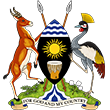![]()
Human Rights
UPCOMING EVENTS
55th session of the Human Rights Council (26 February to 5 April 2024)
https://www.ohchr.org/en/hr-bodies/hrc/regular-sessions/session55/regula...
The Permanent Mission statements at the 55HRC
STATEMENTS BY THE MISSION- 28TH FEBRUARY 2024
Mrs. Mary Namono Kibere, the Counselor and Human Rights Expert at the Mission, delivered a statement at the 55HRC during the enhanced interactive dialogue on Eritrea, and called for dialogue and engagement with Eritrean Government and regional blocs like IGAD to enable sustainable promotion and protection of human rights in Eritrea.
STATEMENTS BY THE MISSION- 29TH FEBRUARY 2024
On 29th Feb 2024 Ambassador Arthur Kafeero, Deputy Permanent Representative delivered a statement at the interactive dialogue on the report of the HC of Human Rights on the occupied Palestinian Territories and called for immediate ceasefire, the release of all captives and urgent need to implement the UN Resolution of Two-State Solution of Israel and Palestine people living side by side in peace.
HUMAN RIGHTS COUNCIL (HRC)
"The Human Rights Council is an inter-governmental body within the United Nations system responsible for strengthening the promotion and protection of human rights around the globe and for addressing situations of human rights violations and make recommendations on them. It has the ability to discuss all thematic human rights issues and situations that require its attention throughout the year. It meets at the UN Office at Geneva.
The Council is made up of 47 United Nations Member States which are elected by the UN General Assembly. The Human Rights Council replaced the former United Nations Commission on Human Rights.
Human rights are rights we have simply because we exist as human beings - they are not granted by any state. These universal rights are inherent to us all, regardless of nationality, sex, national or ethnic origin, color, religion, language, or any other status. They range from the most fundamental - the right to life - to those that make life worth living, such as the rights to food, education, work, health, and liberty.
The Universal Declaration of Human Rights (UDHR), adopted by the UN General Assembly in 1948, was the first legal document to set out the fundamental human rights to be universally protected. The UDHR, which turned 70 in 2018, continues to be the foundation of all international human rights law. Its 30 articles provide the principles and building blocks of current and future human rights conventions, treaties and other legal instruments.
The UDHR, together with the 2 covenants - the International Covenant for Civil and Political Rights, and the International Covenant for Economic, Social and Cultural Rights - make up the International Bill of Rights" (Extract from the OHCHR)
Uganda has not been a council member (the decision making body) since 2013 when its three year term expired.

